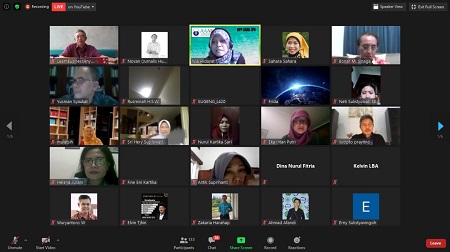Rector of IPB University: Indonesia’s Second Highest Food Waste in the World
Rector of IPB University: Indonesia’s Second Highest Food Waste in the World
 Pandemic makes almost all economic and business sectors experience a decrease in productivity. Not only in Indonesia the weakening is also happening globally. Countries with abundant natural resources have high potential to survive in the COVID-19 Pandemic period. However, this also really depends on the management and utilization that must be done well.
Pandemic makes almost all economic and business sectors experience a decrease in productivity. Not only in Indonesia the weakening is also happening globally. Countries with abundant natural resources have high potential to survive in the COVID-19 Pandemic period. However, this also really depends on the management and utilization that must be done well.
“The progress of a country is not only determined by how rich its resources are but how wisely it can manage its resources. For example, Indonesia occupies the number two food waste and food loss in the world. We can increase food supply by reducing this by using good post-harvest technology, “said Prof. Arif Satria, Rector of IPB University in the Zoom Business Talk activity, organized by Arrbey Consultant in collaboration with IPB University (6/20).
According to Prof. Arif, almost all primary agricultural products have decreased output. The key to saving agriculture is to provide a stimulus to farmers to stay passionate about producing. In addition, other issues that need to be underlined are related to supply chain and logistics. Mainly is supply chain logistics for some food products such as fruit, vegetables, meat and fishery products. Furthermore, Prof. Arif revealed that this momentum needs to be put to good use. It is time for farmers to be accelerated using 4.0 technology. This effort has great potential in Indonesia because in a few years old farmers will be replaced by young farmers. According to him, technology must be prepared so that farmers can survive.
Sucipto Prayitno, Director of PTPN IV said that humans will continue to need energy, food and minerals. Minerals come from extracting and extracting increasingly scarce resources. The energy that is currently being used a lot from coal is being shifted to renewable resources such as water, wind and so on. Furthermore, food is the most sustainable sector and a mainstay sector. The food industry has the best track record because minimal input and optimal results without damaging nature. Demand for food products is also very broad and continues to grow, because the human population continues to grow.
“Agricultural products have also begun to be shifted to renewable fuel products. Indonesia has great potential to win in international industrial competition. The key is how we can utilize this resource properly and wisely, “concluded Sucipto. The discussion ended with a presentation from Prof. Dr. Yusman Syaukat, Professor of the Faculty of Economics and Management (FEM) IPB University who mentioned that bioeconomics could be an alternative solution from the industry. Materials that were previously made from minerals can be replaced with organic raw materials. Natural damage can be reduced while meeting energy needs.
“Bioeconomics is a reality. Other countries have adopted this approach, for example sugar cane processing using genetic technology to achieve efficiency. This bieconomy offers opportunities and solutions in overcoming climate problems, food security and availability and resource efficiency, “said Prof. Yusman.


